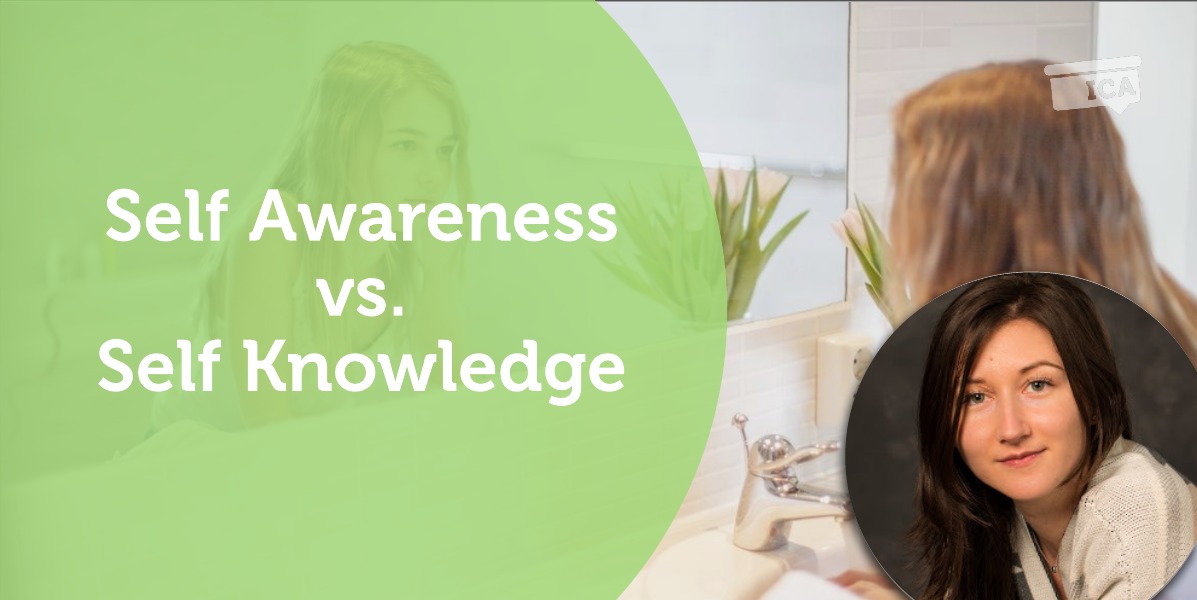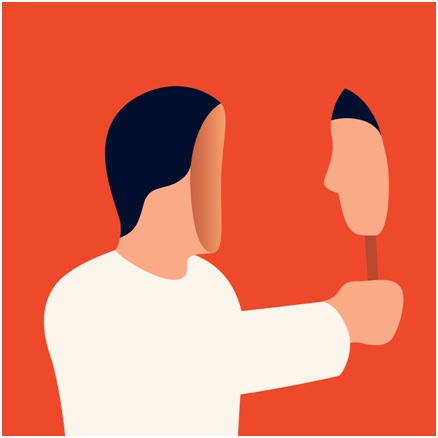 A Coaching Power Tool Created by Laura Maria Vieru
A Coaching Power Tool Created by Laura Maria Vieru
(Transformational Coach, SWITZERLAND)

“Knowing yourself is the beginning of all wisdom”(1)
We all are self-aware, but how developed is our self-knowledge?
Merriam Webster defines self-awareness as the “awareness of one’s own personality or individuality” and self-knowledge as “knowledge or understanding of one’s own capabilities, character, feelings, or motivations”. I am going to borrow Simon Sinek’s words and describe self-knowledge as “finding your WHY”.
Using this tool for ourselves as coaches first, is an opportunity to enlarge our self-knowledge and better support our clients.
Although norms, society, and intellect can play a role in our self-development, studies show that despite all these variables, by the age of 18 months, every human being develops a basic sense of self-awareness by simply identifying themselves in a mirror.
By the age of three, we get to no longer be confused or fearful of seeing ourselves in a mirror but start worrying about how others might perceive us and develop an own perspective about objects and people. By four years old, we identify ourselves and recognize that the name we kept calling out in 3rd person is actually “us”.
All in all, we are quite extraordinary creatures.
Then how do we, as self-aware babies, find our teenage selves drinking too much when we know we are going to regret it the next day? Our adult selves working 60 hours per week when we know our future must maintain a proper life-work balance? Oroursenior selves standing against actions that we used to love in our early days?
We all are self-aware, but how developed is our self-knowledge?
“If you always do what you’ve always done, you’ll always get what you’ve always got.”(2)
From the moment we become self-aware, we try our best to protect ourselves. We start developing patterns/templates that would shelter us and help us survive.
Templates support our learning to anticipate events and understand their sequence, later on leading to structure and logic in our lives. They allow us to be efficient and run on autopilot, take decisions in a matter of seconds, and most importantly, we have been using them for so long that we have enough evidence to support the fact they are working.
So why would we risk looking inside something that seems to be working just fine on its own, and why would you want to let go of the tools and beliefs that have kept us safe for so long?
When the time is right, it is important to reevaluate these beliefs and reconsider whether they continue to support our goals or stand in the way of our growth. Because apart from serving us great so far, they could also be the main inhibitor of our self-knowledge.
Kervin Rae presents a simple story about self-knowledge in a video about “the truth behind your behavior”. In his story, a husband raises a simple question to his wife “Why do always cut the end of the roast when you put it in the oven?”, and the wife answers “Well, that’s how my mother always did”. (All good so far, the wife is aware of the fact and does not contest the fact that indeed she does cut the end of the roast.)
He continues with “Why did she do it”? and she answers, “I don’t know”.(Then the knowledge journey starts.)
This story is a humorous little nugget meant to trigger thinking and deep dive into our own habits.
Because regardless of whether we like to admit it or not, many of us do get stuck at self-awareness and basic self-knowledge and require an impulse towards greater discovery.
There is nothing wrong with leveraging templates and running on autopilot, but what is quintessential is to realize that we do so and take a moment to consider… “hold on for a second, why I am doing this in the first place?” If you were to add one more habit to the list, I would recommend this habit of questioning why.
Simon Sinek also stresses out the importance of why in his book “Start with why”, articulating that “The ability to put a WHY into words provides the emotional context for decisions. When you know your WHY, the highest level of confidence you can offer is: I know it’s right.”
Imagine having that level of confidence, taking control and gaining self-knowledge about our patterns, our image, our position, our capabilities, and unleashing a whole new world of opportunities. Because “If you always do what you’ve always done, you’ll always get what you’ve always got.”
Coaching Application
Coaching is about getting unstuck and taking action, and I find the Self-awareness vs. Self-knowledge tool to be so powerful that it can be dangerous if not sensitively used.
Because the foundation of the tool is built on the single most evaded question in the coaching space, “Why?”.
And although we can tweak the language, it is critical to have a strong base of trust and intimacy where the client understands that no judgment against their beliefs or patterns is being held, and they alone are holding the wheel towards deepening their self-knowledge, at their own pace.
You might consider it at first as a “homework” tool for the client to observe, explore and look for answers before the coaching session, allowing them to start the discovery within the comfort and privacy of their thoughts.
You can invite your client to practice pauses or meditation exercises that will allow them to get in touch with their patterns, beliefs, their importance, and the emotions that get triggered.
During the coaching session, the client is free to share their discoveries and coaches must receive permission before working on broadening the client’s self-knowledge.
Start small by sedimenting the self-awareness around the coaching goal. (i.e. I want to have a better work-life balance because I know that currently I am working too much and keep prioritizing work”)
Then shift to exploring the level of self-knowledge the client has about their awareness and slowly support their own discovery.
Listen for words such as “should”, “need to”, “supposed to”, “must”, “it is good/bad to do that”, which could mean that the client is holding on to a belief.
Start exploring and driving accountability using observations and questions such as:
Reflection
“Helpers Syndrome” was first showcased in Wolfgang Schmidbauer’s books in the 1970s. And, of course, most of us have it. We have it because we are generally kind, good-hearted people that cannot stand to see others struggling. So why not jump in and try to help?
Gaining self-knowledge can be difficult, time-consuming, disruptive, or even painful, but this is a step that the client needs to willingly take if they are determined to get unstuck.
Remember that as a person and a coach, you have your own beliefs and patterns, and a different journey than the one of your client’s.
One major mistake that coaches can do is to help instead of supporting the client, by rushing in with solutions they believe will ease, simplify, and speed up the client’s discovery.
Take a moment to reflect on your own patterns, biases, journey, and your “WHY”, to better support your client.
Because we are all aware of ourselves, but “knowing yourself is the beginning of all wisdom”(1).
References
https://www.francescociccolella.com/Self-Awareness-U-W-Magazine
https://www.verywellmind.com/what-is-self-awareness-2795023
http://www.psychology.emory.edu/cognition/rochat/Rochat5levels.pdf
https://www.edutopia.org/article/bias-starts-early-preschool-can-be-unlearned
https://psychology-spot.com/self-knowledge-levels/
https://casework.eu/lesson/helper-syndrom-when-helping-becomes-a-problem/
Start with Why – Simon Sinek
(1) Aristotle
(2) Henry Ford